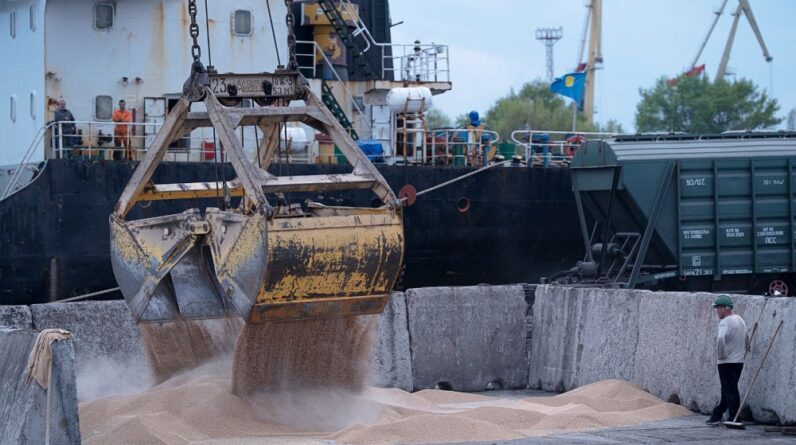
The Kremlin says it will halt grain shipments until demands are met to get its own agricultural shipments to the world.
Russia said Monday it has halted an unprecedented war deal that allows grain to flow from Ukraine to countries in Africa, the Middle East and Asia where hunger is a growing threat and high food prices have pushed more people to poverty
Kremlin spokesman Dmitry Peskov announced the halt to the deal in a conference call with reporters, adding that Russia will return to the deal when its demands are met.
“When the part of the Black Sea agreement related to Russia is implemented, Russia will immediately return to implementing the agreement,” Peskov said.
It is the end of a breakthrough deal the United Nations and Turkey negotiated last summer to allow food to leave the Black Sea region after Russia invaded its neighbor nearly a year and a half ago. A separate agreement facilitated the movement of Russian food and fertilizer amid Western sanctions.
Warring nations are the world’s main suppliers of wheat, barley, sunflower oil and other affordable food products that developing countries depend on.
Russia has complained that shipping and insurance restrictions have hampered its exports of food and fertilizer, also critical to the global food chain.
But analysts and export data say Russia has shipped record amounts of wheat and its fertilizer has also flowed.
The agreement was renewed by 60 days in May amid Moscow’s push. In recent months, the amount of food sent and the number of ships leaving Ukraine have been reduced, with Russia accused of limiting the possibility of more ships taking part.
What impact has the war in Ukraine had on world food prices?
The war in Ukraine sent commodity prices soaring to record highs last year and contributed to a global food crisis also linked to the conflict, the lingering effects of the COVID-19 pandemic, the droughts and other climatic factors.
The high costs of staple food grains in places like Egypt, Lebanon and Nigeria compounded economic challenges and helped push millions more into poverty or food insecurity.
People in developing countries spend more money on food. Poorer nations that rely on imported food priced in dollars also spend more as their currencies weaken and are forced to import more due to climate issues. Places like Somalia, Kenya, Morocco and Tunisia are struggling with drought.
Global food prices such as wheat and vegetable oil have fallen, but food was already expensive before the war in Ukraine and relief has not reached kitchen tables.
“The Black Sea Agreement is absolutely critical to the food security of a number of countries,” and its loss would add to the problems for those facing high levels of debt and climate downturns, said Simon Evenett, a professor at international trade and economic development of the University. of St. Gallen in Switzerland.
He noted that rising interest rates aimed at inflation as well as weakening currencies “are making it difficult for many developing countries to finance dollar purchases in global markets.”
What did the grain deal mean in practice?
The Black Sea Grain Initiative has enabled three Ukrainian ports to export 32.9 million metric tons of grain and other food to the world, more than half to developing countries, according to the Joint Coordination Center in Istanbul.
But the deal has suffered setbacks since it was negotiated by the UN and Turkey: Russia briefly pulled out in November before rejoining and expanding the deal.
In March and May, Russia would extend the agreement for only 60 days, instead of the usual 120. The amount of grain shipped for the month fell from a peak of 4.2 million metric tons in October to 1.3 million tons in May, the lowest volume. since the deal started.
Exports expanded in June to just over 2 million metric tons, thanks to larger ships able to carry more cargo.
Ukraine has accused Russia of preventing new ships from joining the project since late June, with 29 waiting in Turkish waters to join the initiative. Joint inspections aimed at ensuring that ships carry only grain and not weapons that could help either side have also slowed considerably.
[ad_2]
Source link





